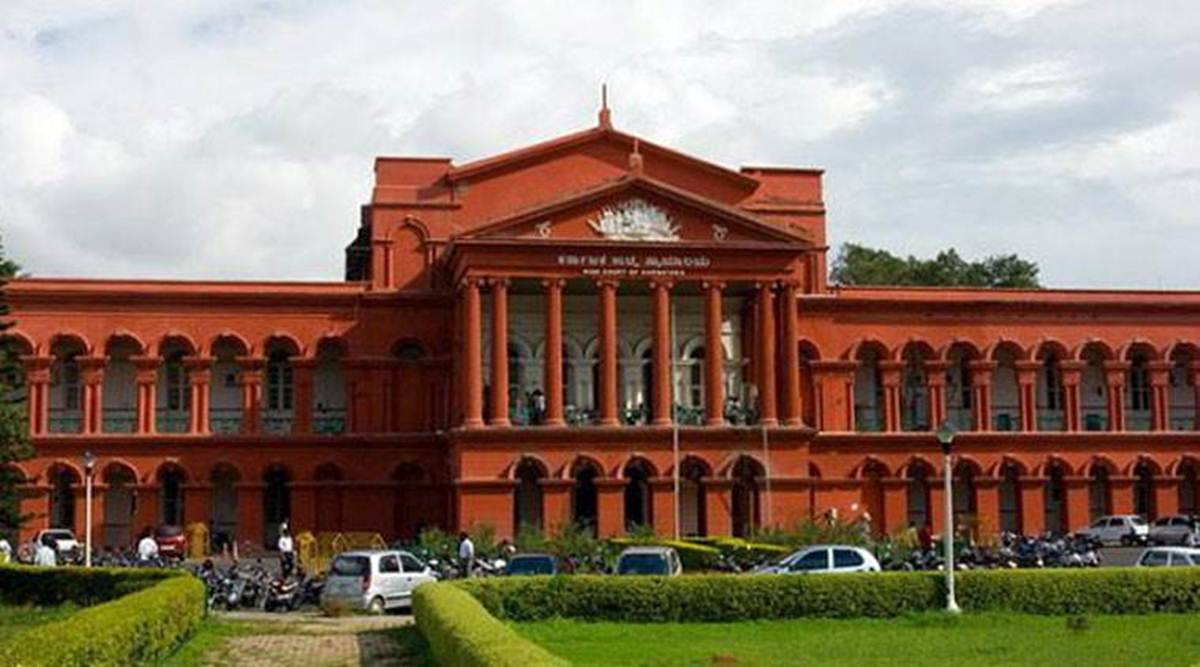 Karnataka High Court. (File)
Karnataka High Court. (File) In a ruling that could help shape the debate on marital rape, the Karnataka High Court Wednesday refused to quash rape charges filed by a wife against her husband, defying the exception in law, and, instead, called on lawmakers to hear the “voices of silence.”
“A man is a man; an act is an act; rape is a rape, be it performed by a man the ‘husband’ on the woman ‘wife’,” a single-judge bench of Justice M Nagaprasanna of the Karnataka High Court said. The “age-old…regressive” thought that “husbands are the rulers of their wives, their body, mind and soul should be effaced,” the court said.
While the court did not explicitly strike down the marital rape exception, it forced the married man to face trial for rape charges brought by his wife. The husband had moved the High Court after a trial court took cognisance of the offence under Section 376 (rape).
IPC Section 375 that defines rape carries a crucial exemption: “Sexual intercourse or sexual acts by a man with his own wife, the wife not being under eighteen years of age, is not rape.”
In 2018, a similar case was brought before the Gujarat High Court in which a married man sought quashing of the rape case against him filed by his wife. Although the HC quashed the FIR to remove the rape charges, it gave a lengthy reasoning on the need to criminalise marital rape.
The Constitutionality of the marital rape exception is currently under challenge before the Delhi and Gujarat High Courts.
The “institution of marriage does not confer, cannot confer and in my considered view, should not be construed to confer, any special male
privilege or a license for unleashing of a brutal beast. If it is punishable to a man, it should be punishable to a man albeit, the man being a husband,” Justice Nagaprasanna said.
“A brutal act of sexual assault on the wife, against her consent, albeit by the husband, cannot but be termed to be a rape. Such sexual assault by a husband on his wife will have grave consequences on the mental sheet of the wife, it has both psychological and physiological impact on her. Such acts of husbands scar the soul of the wives. It is, therefore, imperative for the lawmakers to now hear the voices of silence,” the court said.
This ruling came in the course of a judgment on a petition filed in 2018 by a 43-year-old man for dropping of charges of rape and sexual assault on a child brought against him by police in Bengaluru on the basis of a complaint filed by his wife in March 2017 after a marriage of 11 years.
Following investigations of a complaint of rape, unnatural sex, and marital violence brought against the man by his wife, the police had filed a chargesheet against the man under Indian Penal Code sections for rape, dowry harassment, assault of a woman (IPC 376, 498A, 354) and under the POCSO Act for sexual offences against a child. The police dropped charges of unnatural sex (IPC 377).
The chargesheet was challenged in the High Court by the husband on the grounds that rape charges are not applicable against a man who is the husband of the alleged rape victim. The HC ruled otherwise.
“The contents of the complaint are an outburst of tolerance of the wife…In the teeth of the facts, as narrated in the complaint, in my considered view, no fault can be found with the learned Sessions Judge taking cognizance of the offenses punishable under Section 376 of IPC and framing a charge to that effect,” the judge said.
“If a man, a husband, a man he is, can be exempted from the allegation of commission of ingredients of Section 375 of the IPC, inequality percolates into such provision of law. Therefore, it would run counter to what is enshrined in Article 14 of the Constitution. All human beings under the Constitution are to be treated equally, be it a man, be it a woman and others. Any thought of inequality, in any provision of law, would fail the test of Article 14 of the Constitution,” the HC stated.
The court traced the genesis of Section 375 to Macaulay’s Code that became the basis for the Indian Penal Code of 1860. The exception was “founded and remained on the premise of a contract in (Victorian) medieval law that husbands wielded their power over their wives,” the court said.
“Post Republic, India is governed by the Constitution,” the court said. “The Constitution treats woman equal to man and considers marriage as an association of equals. The Constitution does not in any sense depict the woman to be subordinate to a man. The Constitution guarantees fundamental rights under Articles 14, 15, 19 and 21 which are right to live with dignity, personal liberty, bodily integrity, sexual autonomy, right to reproductive choices, right to privacy, right to freedom of speech and expression. Under the Constitution, the rights are equal; protection is also equal,” the court said.
Justice Nagaprasanna was appointed an Additional Judge of the Karnataka High Court in November 2019 and became a permanent judge in November last year. In 2020, he delivered a landmark ruling on gender equality holding that a married daughter would also be entitled to seek employment on compassionate grounds.
- The Indian Express website has been rated GREEN for its credibility and trustworthiness by Newsguard, a global service that rates news sources for their journalistic standards.

